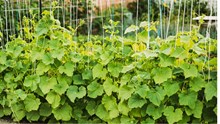
As we all know, Organic farming is the safest way of farming, which protects humans, plants, and the whole ecosystem. We people are slightly shifting towards Organic Farming. So, let us take a step in the world of organic farming by using Organic Pest Management Techniques.
Let us understand different techniques of Pest Management in an Organic way without the use of chemicals-
1. Cultural Practices
To protect the crop from pests, some traditional cultural practices can be done. It includes Crop Rotation, Intercropping, etc. Crop rotation is the potential method of preventing pests from getting used to any single type of plants that are being cultivated. This method uses the cultivation of alternate species of crops every year. Along with the management of pests, this farming method also increases the fertility of the soil. After then, coming towards Intercropping, it involves simultaneous cultivation of two or more crops on the same farm. The definite distance remains between crops of the same species. So, this technique is efficient in attracting pests away from their target host plant.
2. Sticky Traps
As clear by the name, these are particular color traps and a sticky substance is spread over them. These traps are used to catch the insect which is attracted to a particular color. For cucumber beetles, a white color mobile trap can be used. Take a large object and paint it white and move it in crop rows, cucumber beetles will be attracted towards that. For whiteflies, fruit flies, and all the common insects, the yellow trap can be used. And put that yellow trap at a distance of 3-5 feet.
3. Mechanical or Physical Pest Control
This is one of the simplest methods of pest control. This includes cutting, mulching, mowing, tillage, and organic soil coverage and barriers. This method also includes simply hand-packing insects or hand-pulling weeds. Some devices can also be used to protect crops from pests. It includes row covers, protective nets with varying mesh sizes according to the pests. Insect vacuums can be used to eliminate insects from the plant surface and collect them into a collection box. Water spray can also be deputed to remove some insects from the plant surface.

4. Biological way of pest control
This includes the use of beneficial microorganisms that can be sent to the farm to reduce the pests. This method is of three types. The first one is the importation of pests’ natural enemies, which do not occur naturally there but are released on the farm. The second is, boosting the naturally occurring population of beneficial microorganisms. And the third one is the conservation of existing natural enemies of pests in the environment.
5. Oil Sprays
Oil sprays suffocate the pests. If sprayed directly on the pest, it is more effective. One care must be taken in this, i.e., don’t spray on the plants which are suffering from moisture stress and also don’t spray during hot summer days. Use potential oils to kill the insect eggs and spray on bare branches of plants. Use lighter and more refined horticultural oils to spray on growing plants. And don’t spray during peak flowing times and blossoms.
6. Bio-Pesticides
Bio-pesticides harm neither plants nor farmers. The most common bio-pesticide that Indian farmers use is Neem. Neem water can be sprayed on crops to protect them from pests. Bio-pesticides have no risk to the environment. These are slow-acting pesticides and have relatively critical application times. But, bio-pesticides have no residue problems, so they don’t damage the crops.
These are the 6 effective and organic ways to manage pests. For more information like this, Stay connected…!!
Happy Farming…!!
















